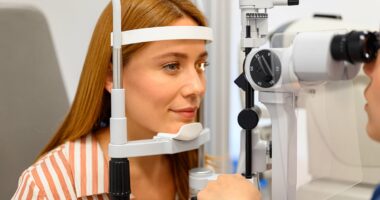Share this @internewscast.com
For Katryna Rogers, her father’s dementia diagnosis confirmed her worst fears.
Robert Rogers had always been upbeat and energetic. He enjoyed spending time with his family and watching his local football team, Barrow AFC.
But in 2021, the former YMCA worker from Cumbria, who was 58 at the time, began to change.
Robert began experiencing memory issues. Initially, it was minor things like remembering to take his medication. However, as Katryna observed, the issue worsened, and he eventually started forgetting to eat and maintain personal hygiene.
Katryna, 34, who had previously cared for her mother when she developed dementia, says she recognised the symptoms.
In January 2022, she took her father to see his GP who, after running a few tests, agreed with Katryna’s diagnosis.
The doctor diagnosed Robert with frontotemporal lobe dementia. This condition, affecting about 20,000 people in the UK, primarily impacts speech and behavior. Unfortunately, it has no cure and is fatal.
This is the same type of dementia that afflicted US actor Bruce Willis three years ago. Last month, his wife, Emma Heming Willis, mentioned that his brain is deteriorating, affecting his language abilities.

Robert Rogers was diagnosed with dementia at 59 after a bad bout of depression
Katryna says she had expected to hear that her father had dementia, but it was what the doctor said next that took her by surprise.
‘I asked him how he thought he developed dementia,’ she says. ‘He suggested it was unlikely to be genetic because no one in my father’s close family had experienced dementia.
‘Instead, he said he thought the most likely cause was depression.
‘I was really shocked. I had no idea that depression could cause dementia – it didn’t sound real.’
However, Katryna agreed it was true that Robert had, at times in his life, dealt with depression.
During his early years, Robert experienced what he referred to as ‘mild depression,’ but he seemed to have conquered this common mood disorder, affecting one in six adults in the UK, as he aged.
However, after Robert went through a bad relationship break-up in 2021, his depression returned.
He became reclusive and prone to long silences.
‘I knew he was struggling after his relationship ended, but it wasn’t until he declined an invitation to the football that I realized something was deeply wrong,’ Katryna shares.
At the time, Katryna had taken Robert to see the same GP, who had diagnosed him with severe depression. He had also prescribed Robert antidepressants and referred him for talking therapy.
But, the GP explained, this may have come too late.
‘His argument was that the stress of the break-up and the low mood that followed could have damaged my dad’s brain,’ says Katryna.

Actor Bruce Willis pictured with his daughter Scout in 2023
It sounds almost unbelievable that low mood could bring about brain damage, however research shows that depression and dementia are strongly linked.
In fact, according to The Lancet Commission, a group of world-leading dementia researchers, having depression effectively doubles the risk of developing the brain disease.
How exactly the two conditions are linked remains debated amongst experts.
Some argue that depression is simply an early symptom of dementia.
‘When dementia begins one of the first parts of the brain to be affected can be the area connected to mood,’ says Prof Robert Howard, a dementia expert at University College London (UCL).
‘For this reason, it’s not unheard for the first sign of dementia to be depression. Sometimes this can occur as long as a decade before other, more well-known symptoms like memory loss, arise.’
However, other experts, like Prof Gill Livingston, also a dementia expert at UCL, disagree, pointing to research that shows that those who experience depression in their youth are significantly more likely to have dementia.
‘One reason for this might be that people with dementia are more likely to neglect their physical and cognitive health,’ says Prof Livingston.
‘We know that regular physical exercise and social interaction are important to reducing the risk of dementia. And we know that people with depression are less likely to do both.
‘So it’s possible this is why we see such a strong link between the conditions.’
Crucially, research shows that treating depression slashes the risk of dementia occurring.
‘People who take antidepressants and take part in therapy don’t appear to have the same added risk of dementia as those who don’t,’ says Prof Livingston.
‘It’s another reason why it’s so important that people with depression seek help.’
According to the Lancet Commission, which published its most recent report last year, there are 14 avoidable risk factors that raise the risk of dementia.
Along with depression, these also include not exercising, smoking, high alcohol consumption, diabetes and social isolation.
Last year, high cholesterol – fatty plaque that builds up in the blood, usually due to poor diet – as well as untreated vision problems, were added to the list.
However, this advice will come too late for Robert Rogers.
Since his diagnosis, Robert’s condition has deteriorated and he now lives in a care home.
‘He has good days and bad days,’ says Katryna, his daughter. ‘He still watches the football on the TV, but sometimes he can’t remember what team he supports.
‘It’s completely changed how I view depression. Anyone going through this shouldn’t suffer in silence like my dad did.
‘Even a couple of talking therapy sessions can make a massive difference.’















